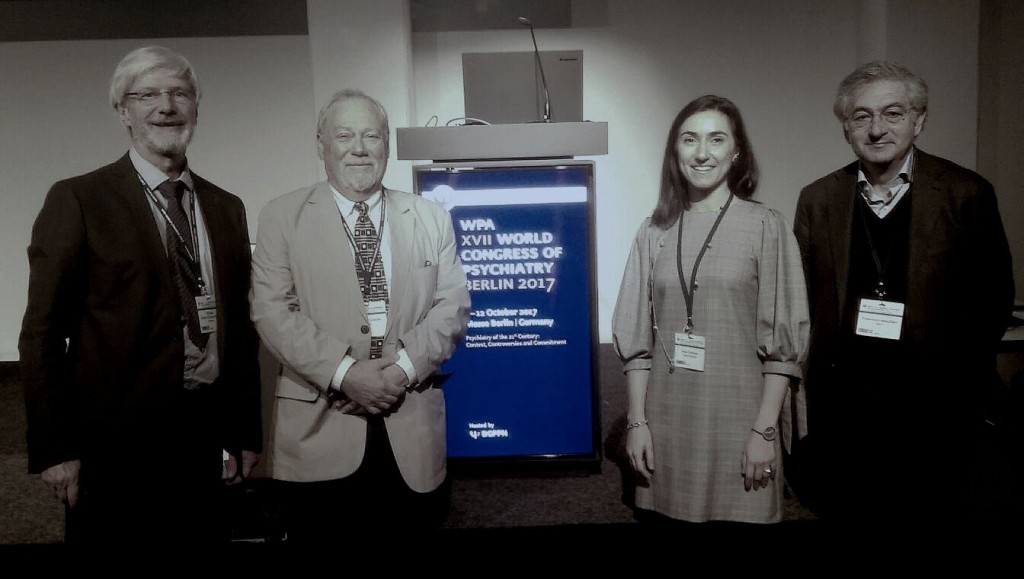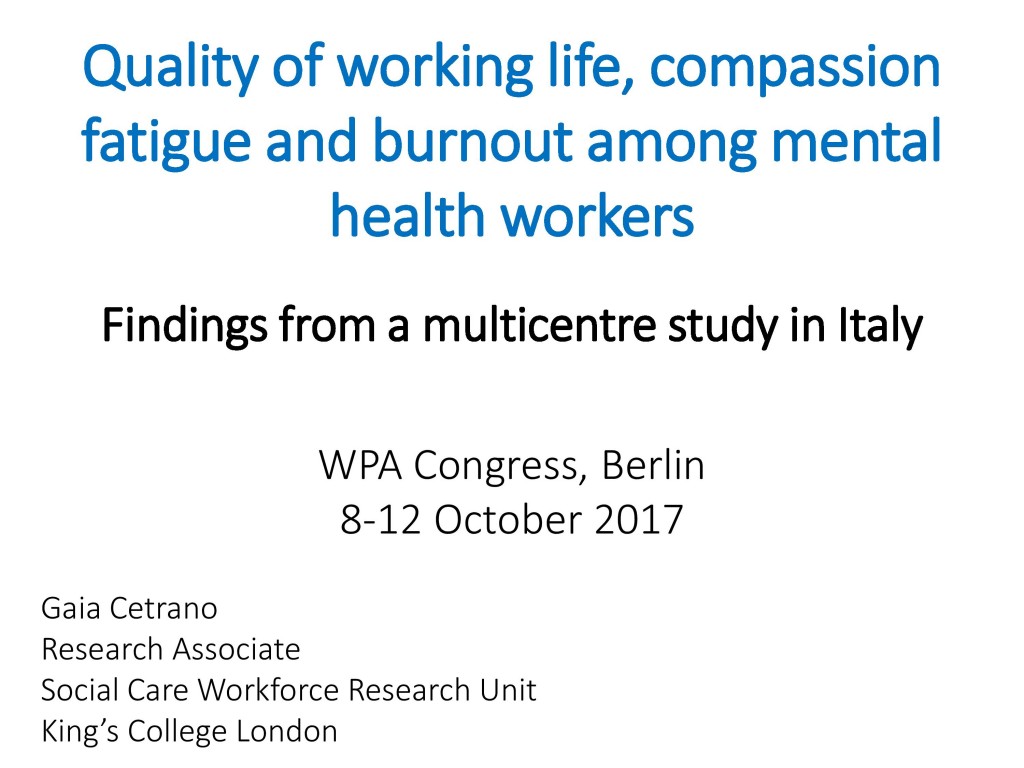 Gaia Cetrano is a Research Associate at the Social Care Workforce Research Unit, King’s College London. (800 words)
Gaia Cetrano is a Research Associate at the Social Care Workforce Research Unit, King’s College London. (800 words)
From 8 to 11 October I joined the World Psychiatric Association XVII Congress in Berlin. This was my second WPA Congress; I also attended the previous one in Madrid in 2014. Berlin is a great city, which has developed at a tremendous pace in the last few decades. It perfectly represents how things can change, and thus offered the best context for a congress entitled ‘Psychiatry of the 21st Century’.
Remembering the Madrid Congress, I was expecting this to be a big event, but this one exceeded all my expectations. When I arrived at the venue, Messe Berlin, to join the opening ceremony on the first day, I suddenly felt overwhelmed, if not intimidated, by everything around me. The venue was enormous, there were stands, films, exhibitions, music, and hundreds and hundreds of disoriented-looking people around me (around 10,000 in fact). The programme, with its 900 sessions, was impressive but daunting.
Dinesh Bhugra, Emeritus Professor of Mental Health and Cultural Diversity at King’s College London, and currently president of WPA, set the scene in his opening speech for the upcoming days. I then got to know… Nigel! Nigel was introduced to us by Sir Simon Wessely, Professor of Psychological Medicine at King’s. Apparently, Nigel was a medical student who after attending a psychiatry residency wrote a letter to Professor Wessely saying he didn’t want to have anything to do with psychiatry any longer, that he didn’t like it and would never become a psychiatrist in his life. Professor Wessely, in a very captivating speech, recounted his answer to Nigel.
Nigel, Professor Wessely argued, seemed not to have understood one simple thing, that ‘he (Nigel) cannot escape us (the psychiatrists)’. Whatever medical career Nigel decides to undertake, he will inevitably have to face what he is trying to ignore. For example, 80% of common mental disorders, such us depression and anxiety, are seen in primary care. In A&E 20% to 40% admissions are related to drugs and alcohol problems, and patients with any long-term condition have three times the rate of depression as other people. Moreover, Professor Wessely showed that mental health problems are now the largest cause of sickness absence from work. These few figures are enough to show how mental health problems are encountered by every healthcare professional in every setting and reveal the importance of supporting greater integration of mental health and physical health care. However, it somehow feels such integration is far from complete. As an example, Professor Wessely showed the location of the Maudsley Hospital and the King’s College Hospital in London. A road separates the two hospitals and, Professor Wessely said quite ironically, one of the best things done to integrate the two services, was to install a pedestrian crossing traffic light!

At the conference (L to R): Michael Sadre-Chirazi-Stark, Germany; Wolfgang Linden, Canada; Gaia Cetrano, Italy; Francesco Amaddeo, Italy.
On 9 October I gave my presentation. My paper ‘Quality of working life, compassion fatigue and burnout among mental health workers’ was part of a Symposium on ‘Stress and its impact on work-life balance and clinical aspects’. My three fellow presenters, from Canada, Italy, and Germany, took part in the symposium. I presented the results of a study that was part of my PhD at the University of Verona, Italy, looking at aspects affecting the three dimensions of Compassion Fatigue, Burnout and Compassion Satisfaction. The study was conducted in three mental health departments in Northern Italy and involved 400 professionals, including psychiatrists, psychiatrists in training, psychologists, social workers, nurses, rehabilitation therapists, and healthcare support workers. The results showed that time pressures at work can significantly affect compassion fatigue and burnout. Other important aspects, as detailed in the presentation, are: building trustful relationships with managers and colleagues, training, quality of meetings, and work-life balance.
The symposium had a good turnout, around 50-60 people, and there were several questions and comments after the presentations. It was a great opportunity to network with other professionals and researchers who work on these topics. I was lucky to present on the first day so I could then relax and enjoy the congress. I attended various sessions and learnt a lot about different topics, including e-mental health and how to recognize quality in internet-based interventions, transition from child to adult mental health services, psychiatry in the cinema, mental health among migrants in Finland, and perinatal mental health care in Brazil. In hindsight, I probably would have appreciated more sessions discussing the social aspects of mental health care, such as social rehabilitation, social inclusion, and community work. At times I felt the congress had more a medical focus which I am not so familiar with since as a social worker my perspective is a bit different. Nonetheless, it was a real privilege to attend the congress and a great opportunity to get to know researchers and practices from other countries around the world.
Gaia Cetrano is a Research Associate at the Social Care Workforce Research Unit, King’s College London.
Reference
Cetrano, G., Tedeschi, F., Rabbi, L., Gosetti, G., Lora, A., Lamonaca, D., Manthorpe, J., & Amaddeo, F. (2017). How are compassion fatigue, burnout, and compassion satisfaction affected by quality of working life? Findings from a survey of mental health staff in Italy. BMC Health Services Research, 17(1), 755. doi:10.1186/s12913-017-2726-x
